by [email protected] | Oct 6, 2021 | Prescriptions for your Practice
Podcast: Play in new window | Download
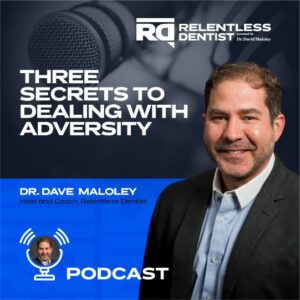 What’s your favorite movie of all time?
What’s your favorite movie of all time?
I can greatly identify with the Rocky series’ story of resilience and perseverance, both onscreen and the underlying story on how Sylvester Stallone fought all adversity to have the movie get its screen time. It’s been my go-to movie whenever I’m confronted with roadblocks.
All of us went through one of the worst times last year, and it has tested our character and faith. But, it has also been a period of discovery that we’re far stronger than we thought we were.
In today’s episode, I’ll be talking about resilience. The difficulty we face as practice owners have exponentiated to a great degree in these crazy times. I’ll share three ways to keep a proactive stance on resiliency in dealing with adversity, rise above the occasion, and get back up better and stronger.
Tune in and find solutions to common practice issues at Prescriptions for Your Practice.
Key Quotes:
- “Make sure that you’re setting 90-day goals that bring out the best in you and your team.”
- “In being resilient, we can see opportunities in these radical shifts. You have to be aware and stay on offense so you can seize them.”
- “It’s better to be proactive and stay in the offense during turbulent times than to be caught off guard.”
- “Resilient businesses would need resilient cultures, and resilient cultures require resilient leaders.”
- “Sometimes positive thinking will keep us in denial of what is. We can face the brutal facts; we can look at the reality of what is and still be hopeful.”
- “In difficult times, we have to stay purpose-driven.”
- “Adaptability, mental agility is a hallmark of resilience.”
- “There are always lessons in deep, dark, difficult times; there are always gems to be mined.”
- “Sometimes in business and life, we have to color outside the lines and do whatever is required.”
Featured on the Show:


by [email protected] | Sep 29, 2021 | Prescriptions for your Practice
Podcast: Play in new window | Download
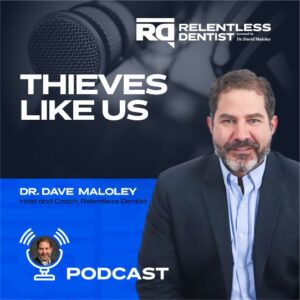 5% of people are hard-wired for integrity, while 5% are hard-wired to lie, cheat, and steal even if it doesn’t benefit them. Interestingly, 90% of people will lie, cheat, and steal given three things. Listen in to find out.
5% of people are hard-wired for integrity, while 5% are hard-wired to lie, cheat, and steal even if it doesn’t benefit them. Interestingly, 90% of people will lie, cheat, and steal given three things. Listen in to find out.
We always attribute “stealing” to something tangible, not realizing that there are some abstract constructs that directly affect the practice’s finances.
In this episode, I will discuss the three things that make 90% of people subscribe to some degree of misgiving, why assessing character is complex, and what you can do about it. I will also share my insights on how you can differentiate the strong character from the weak and thoroughly assess your potential hire’s personality before introducing them into your culture.
Tune in and find solutions to common practice issues at Prescriptions for Your Practice.
Key Quotes:
- “There’s nothing more viable in your practice than your character as a leader and the character of your team.”
- “Money doesn’t have a conscience.”
- “What really exposes our character is difficult circumstances.”
- “Strong character comes from the feeling of security and self-worth.”
- “Weak characters are overcome by the circumstances.”
- “Think about the character in your hiring. Think about this collective character that is not only additive but creates a synergistic effect for better or worse.”
- “Make sure that you’re not too simple in your interview questions.”
- “Your home environment and work environment can bring out the best in you or the worst in you.”
- “We need to have a growth mindset and understand that you can become whoever you want to become.”
- “We all have things that we put in our backpacks as little kids and carry with us into adulthood that don’t serve us, that don’t service our practice, that don’t serve our patients, that don’t serve our team.”
Featured on the Show:


by [email protected] | Sep 22, 2021 | Prescriptions for your Practice
Podcast: Play in new window | Download
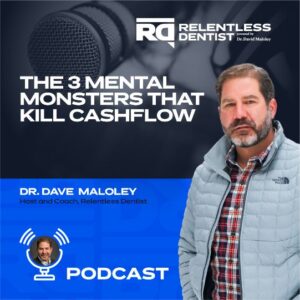 “Until you make the unconscious conscious, it will direct your life and you will call it fate.” – Carl Jung
“Until you make the unconscious conscious, it will direct your life and you will call it fate.” – Carl Jung
How’s your relationship with yourself, your profession, and with people? Are they standing in the way of enjoying the abundance of the dental profession? Or is it your thinking that’s killing the cash flow?
Money is not meant to be chased; you need to attract them. And learning from experience, it’s not all about skills and work ethics. Of course, it is essential, but what’s blocking the flow lives within your psyche, and a little re-wiring will help attune your practice to the cash flow.
This episode will talk about the three mental monsters that kill cash flow and how your thinking can quash these monsters by bringing out your unfair advantage. I will also touch on how you can take charge of your thinking and focus on adding value to yourself, your team, and your patients to address your financial worries.
Tune in and find solutions to common practice issues at Prescriptions for Your Practice.
Key Quotes:
- “If we don’t have proper architecture, both the enjoy and the cash flow becomes difficult.”
- “Many dentists are frustrated because the clinical skill alone doesn’t cut it.”
- “The way we think causes money and quality of life.”
- “The power of the skill stack is either divided or multiplied by the way we think.”
- “Make sure that your mind and thinking is serving you, your goals, and your business.”
- “What really unleashes a business are business skills, leadership skills, and sales skills.”
- “We can change our thinking if we are deliberate about it.”
- “Make a list of reasons that you’re worth more per hour than you’re currently paying yourself.”
- “If we focus on what we’re getting and not focusing on what we’re giving, that can enhance our scarcity thinking.”
- “Money always follows unique value.”
Featured on the Show:


by [email protected] | Sep 15, 2021 | Prescriptions for your Practice
Podcast: Play in new window | Download
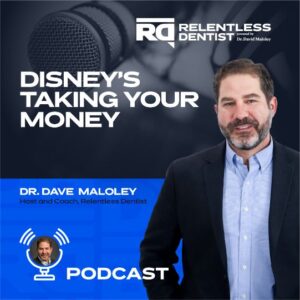 “Togetherness, for me, means teamwork.” — Walt Disney
“Togetherness, for me, means teamwork.” — Walt Disney
Yes, Disney’s taking our money — money that we gladly give. In fact, we work our fingers to the bone just for us, and our loved ones enjoy a moment of pleasure in the happiest place on earth.
But what is so great about Disney that we’re willing to do prodigal spending to the extent of cutting costs on essential expenditures like dental care? Can we adapt and make the Disney magic work in our practice?
In this episode, I’ll delve into the principles that make Disney appeal to the core of our senses. The reasons why we trust the company and will continue to spend our money on them even after the magic no longer works on us. And most importantly, how our practice can learn from the values that Mr. Walt Disney himself established to which the company is built upon.
Disney’s taking our money. Wouldn’t it be fair to “steal” their strategies in enthusing clients and recover the money we’ve willingly given to Disney?
Tune in and find solutions to common practice issues at Prescriptions for Your Practice.
Key Quotes:
- “We oftentimes lose sight, or we don’t fully appreciate who our competitors really are.”
- “We can steal like an artist and understand the principles that allow some of these big companies to take the healthcare dollars and put them in their pocket. This way, we can generate more loyal patients, better case acceptance, and referrals.”
- “If we’re working under the assumption that Disney is one of our competitors, it would be wise for us to understand some of the principles that allow them to consistently enthuse their clients.”
- “There are unlimited things to make sure that the patient feels that your place is clean and safe and a place where they want to continue to have healthcare.”
- “We want to go into a business, whether healthcare or not, that is courteous.”
- “Efficiency is shifting the pendulum from “needing more resources” to “I am resourceful.””
- “Your competitor is anyone who’s creating a reallocation of precious healthcare dollars away from healthcare.”
Featured on the Show:


by [email protected] | Sep 8, 2021 | Prescriptions for your Practice
Podcast: Play in new window | Download
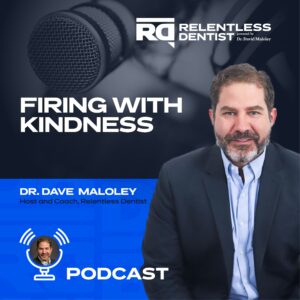 “The day firing becomes easy is the day to fire yourself.” — Tom Peters
“The day firing becomes easy is the day to fire yourself.” — Tom Peters
Kid you not — firing someone is never easy. It’s not only the investment in training, tools, and all things to help them grow, but more importantly, the emotional investment not just by you but by the whole team. And if letting go of your people becomes frequent, it makes you question your hiring process, the work culture, and even yourself. There’s nothing worse than having to fire someone. It’s agonizing but necessary, especially if it’s already ill-affecting the workplace. So the question is, what’s the nicest way to let go of an employee?
In this episode, I will share TIPS (not legal advice) on how to fire someone in the nicest way possible. Like I mentioned a few podcasts back, your goal is to provide your employees with all the training, tools, and support needed to prepare them for their future employment. You can’t keep them forever. The best compensation you can give your employees is to contribute to their employability.
Tune in and find solutions to common practice issues at Prescriptions for Your Practice.
Key Quotes:
- If you get the culture right, it becomes an immune system.
- Firing gets easier, but it’s never easy because we care about these people. Essentially, hiring them is betting on their success.
- Sometimes people slip through the cracks. You hired right, you onboarded them right, you gave them all the tools and the training to succeed, and they’re just not a fit — either culture-wise, productivity-wise, or both.
- There are some people in our organizations that aren’t going to be productive; they’re not going to be culture fits or a combination of them.
- In today’s day and age, you need some litigation protection support, and it’s a good idea to consult an attorney before you fire somebody.
- If you’re going to terminate somebody, it should not surprise them or the other team members.
- Your number one job is to defend the mission and culture.
- If anyone is underperforming for a lengthy amount of time, they are not comfortable at work; they are just there to get the money.
- Even your best performer can go and turn on you.
- If somebody is not contributing and is eroding the culture, then you must let the person go.
Featured on the Show:
- I appreciate your feedback. Let me know what you learned and loved here: [email protected].


by [email protected] | Sep 1, 2021 | Prescriptions for your Practice
Podcast: Play in new window | Download
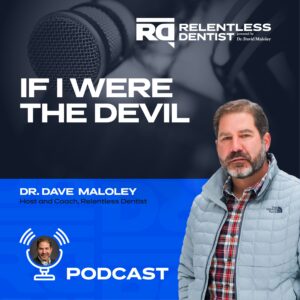 “If I were the devil, I’d soon have families at war with themselves, churches at war with themselves and nations at war with themselves until each, in its turn, was consumed.” — Paul Harvey
“If I were the devil, I’d soon have families at war with themselves, churches at war with themselves and nations at war with themselves until each, in its turn, was consumed.” — Paul Harvey
I’m not being political, religious, or whatnot, but Paul’s strong message in his 1965 broadcast has proven to be prophetic — how elements of good and evil are at play in constant dynamic throughout global history. You might think these are inevitable in the grand scheme of things, but these are more imminent in our practice. One thing is clear — an organization is created or destroyed from the inside out. Hence, the critical question right now is, “Where do we go from here?”.
In this episode, I’ll dive into the psychology of destroying the practice from the inside. Then, I’ll cover the four elements you need to stop to avoid negativity and toxicity in your practice. Ultimately, it would help if you quickly diagnose when your mind isn’t serving you and your goals, patients, and vision before falling into the dark side.
Tune in and find solutions to common practice issues at Prescriptions for Your Practice.
Key Quotes:
- If we know how to destroy a dental practice, we know how to build it up very quickly.
- Stop your blame. It’s your practice, and if you blame other things, outside forces, you’re giving away the power to create a vision and bring it into reality.
- If you’re in a conversation with villains and heroes, no one’s coming to save you. That’s a position of weakness, and we have to get you back into creator mode.
- My practice is not limited by its opportunity. It’s limited by its leader.
- Excuses and reasons are just an attempt to lessen the blame that you’re attaching to yourself after a mistake, a mishap, a wrongdoing, an upset patient.
- If you can change the situation, then do it. If you can’t, then you are forced to accept it.
- Stop speaking ill of others even if you feel that they deserve it.
- Being 100 percent responsible doesn’t mean beating yourself up.
- We need better leaders in these wild times.
Featured on the Show:


 What’s your favorite movie of all time?
What’s your favorite movie of all time?


 5% of people are hard-wired for integrity, while 5% are hard-wired to lie, cheat, and steal even if it doesn’t benefit them. Interestingly, 90% of people will lie, cheat, and steal given three things. Listen in to find out.
5% of people are hard-wired for integrity, while 5% are hard-wired to lie, cheat, and steal even if it doesn’t benefit them. Interestingly, 90% of people will lie, cheat, and steal given three things. Listen in to find out. “Until you make the unconscious conscious, it will direct your life and you will call it fate.” – Carl Jung
“Until you make the unconscious conscious, it will direct your life and you will call it fate.” – Carl Jung “Togetherness, for me, means teamwork.” — Walt Disney
“Togetherness, for me, means teamwork.” — Walt Disney “The day firing becomes easy is the day to fire yourself.” — Tom Peters
“The day firing becomes easy is the day to fire yourself.” — Tom Peters “If I were the devil, I’d soon have families at war with themselves, churches at war with themselves and nations at war with themselves until each, in its turn, was consumed.” — Paul Harvey
“If I were the devil, I’d soon have families at war with themselves, churches at war with themselves and nations at war with themselves until each, in its turn, was consumed.” — Paul Harvey